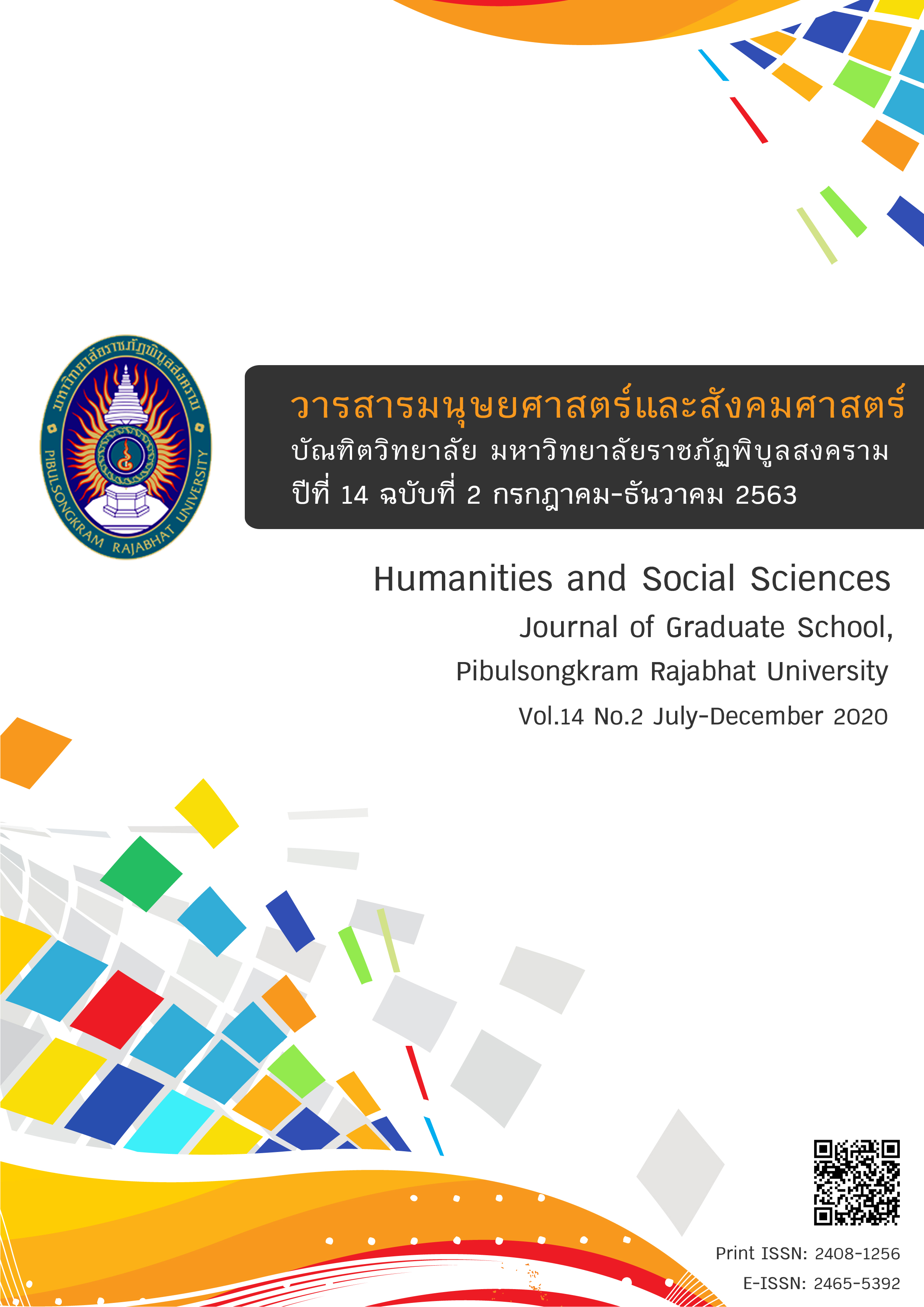การพัฒนาบทปฏิบัติการวิทยาศาสตร์เกี่ยวกับภูมิปัญญาท้องถิ่นของบ่อเกลือ จังหวัดน่าน เพื่อพัฒนากระบวนการคิดและแก้ปัญหาสำหรับนักศึกษาของมหาวิทยาลัยเทคโนโลยีราชมงคลล้านนา
คำสำคัญ:
บทปฏิบัติการวิทยาศาสตร์, ภูมิปัญญาท้องถิ่น, กระบวนการคิดและแก้ปัญหาบทคัดย่อ
การวิจัยครั้งนี้มีวัตถุประสงค์ 1) เพื่อสร้างบทปฏิบัติการทางวิทยาศาสตร์เกี่ยวกับภูมิปัญญาท้องถิ่นของ บ่อเกลือ จังหวัดน่าน เพื่อพัฒนากระบวนการคิดและแก้ปัญหาของนักศึกษา มหาวิทยาลัยเทคโนโลยีราชมงคลล้านนาที่มีประสิทธิภาพตามเกณฑ์ 80/80 2) ศึกษาผลสัมฤทธิ์ทางการเรียนของนักศึกษาก่อนและหลังเรียนด้วยบทปฏิบัติการทางวิทยาศาสตร์เกี่ยวกับภูมิปัญญาท้องถิ่นของบ่อเกลือ 3) ศึกษากระบวนการคิดและแก้ปัญหาก่อนและหลังเรียนด้วยบทปฏิบัติการทางวิทยาศาสตร์เกี่ยวกับภูมิปัญญาท้องถิ่นของบ่อเกลือ กลุ่มตัวอย่างที่ใช้ในการวิจัยในครั้งนี้ ใช้วิธีเลือกตัวอย่างแบบเจาะจง (Purposive Sampling) จากนักศึกษามหาวิทยาลัยเทคโนโลยีราชมงคลล้านนา น่าน ในภาคเรียนที่ 1 ปีการศึกษา 2562 จำนวน 30 คน เครื่องมือที่ใช้ในการวิจัยประกอบด้วยบทปฏิบัติการวิทยาศาสตร์เกี่ยวกับภูมิปัญญาท้องถิ่นของบ่อเกลือ จังหวัดน่าน แบบวัดผลสัมฤทธิ์ทางการเรียน แบบวัดกระบวนการคิดและแก้ปัญหา แบบสังเกตพฤติกรรม โดยใช้สถิติในการวิเคราะห์ข้อมูล คือ ร้อยละ ค่าเฉลี่ย ส่วนเบี่ยงเบนมาตรฐาน และสถิติที่กรณีตัวอย่าวสองกลุ่มไม่เป็นอิสระจากกัน ผลการวิจัยพบว่า 1) องค์ความรู้และภูมิปัญญาท้องถิ่นของบ่อเกลือที่นำมาพัฒนาเป็นบทปฏิบัติการวิทยาศาสตร์มี 5 เรื่อง ได้แก่ (1) การเกิดน้ำบ่อเกลือ (2) สมบัติของน้ำบ่อเกลือ (3) กระบวนการผลิตเกลือด้วยการระเหย (4) กระบวนการผลิตเกลือด้วยการตกผลึก และ (5) การแปรรูปผลิตภัณฑ์จากเกลือสินเธาว์ภูเขา 2) บทปฏิบัติการทางวิทยาศาสตร์เกี่ยวกับภูมิปัญญาท้องถิ่นของบ่อเกลือที่สร้างขึ้นมีประสิทธิภาพ (E1/E2) 83.73/84.92 3) ผลสัมฤทธิ์ทางการเรียนของนักศึกษาหลังเรียนสูงกว่าก่อนเรียนด้วยบทปฏิบัติการวิทยาศาสตร์เกี่ยวกับภูมิปัญญาท้องถิ่นของบ่อเกลือ อย่างมีนัยสำคัญที่ระดับ .05 4) คะแนนเฉลี่ยกระบวนการคิดและแก้ปัญหาของนักศึกษาหลังเรียนสูงกว่าก่อนเรียนด้วยบทปฏิบัติการวิทยาศาสตร์เกี่ยวกับภูมิปัญญาท้องถิ่นของบ่อเกลือ อย่างมีนัยสำคัญที่ระดับ .05 และความสามารถกระบวนการคิดและแก้ปัญหาอยู่ในระดับดี
เอกสารอ้างอิง
กองการศึกษาน่าน. (2559). เล่มหลักสูตรรายวิชาศึกษาทั่วไปฉบับปรับปรุงปี พ.ศ. 2560. เชียงใหม่: มหาวิทยาลัยเทคโนโลยีราชมงคลล้านนา.
ชลีรัตน์ พยอมแย้ม, วันเพ็ญ แก้วพุก, และสุกัญญา แย้มสรวส. (2553). รายงานการวิจัยเรื่องการวิจัยและพัฒนาแหล่งเรียนรู้ธรรมชาติระบบนิเวศชายน้ำ อ. สามพราน จ. นครปฐม (รายงานผลการวิจัย). นครปฐม: มหาวิทยาลัยราชภัฏนครปฐม.
ญาณัญฎา ศิรภัทร์ธาดา. (2553). การพัฒนาพฤติกรรมการเรียนและผลสัมฤทธิ์ทางการเรียนของนักศึกษาในการเรียนวิชาหลักการตลาดโดยการสอนแบบมีส่วนร่วม (Active Learning) (รายงานผลการวิจัย). กรุงเทพฯ: มหาวิทยาลัยราชภัฏสวนสุนันทา.
นุชนภา พลสรรค์. (2557). การพัฒนาบทปฏิบัติการเรื่อง พันธะไอออนิก เพื่อส่งเสริมทักษะกระบวนการทางวิทยาศาสตร์ของนักเรียนชั้นมัธยมศึกษาปีที่ 4 โรงเรียนคณะราษฎร์บำรุงปทุมธานี (วิทยานิพนธ์ศิลปศาสตรมหาบัณฑิต). มหาวิทยาลัยรังสิต, กรุงเทพฯ.
ปัญฉัตร หมอยาดี. (2555). การสืบทอดและการพัฒนาการผลิตเกลือสินเธาว์ ตำบล บ่อเกลือใต้ อำเภอบ่อเกลือ จังหวัดน่าน. นนทบุรี: คณะสังคมศาสตร์ มหาวิทยาลัยสุโขทัยธรรมาธิราช.
พิชชานันท์ จันทพรม. (2559). การพัฒนาบทปฏิบัติการวิทยาศาสตร์ เรื่อง ปิโตรเลียมสำหรับนักเรียนชั้นมัธยมศึกษาปี ที่ 6 (วิทยานิพนธ์วิทยาศาสตรมหาบัณฑิต). มหาวิทยาลัยราชภัฏมหาสารคาม, มหาสารคาม.
เรณู เทพเทียมทัศน์. (2556). การพัฒนาบทปฏิบัติการวิทยาศาสตร์โดยใช้ภูมิปัญญาท้องถิ่นเป็นฐานสำหรับนักเรียนชั้นประถมศึกษาปีที่ 6 (วิทยานิพนธ์วิทยาศาสตรมหาบัณฑิต). มหาวิทยาลัยราชภัฏกาญจนบุรี, กาญจนบุรี.
วรรณภา เหล่าไพศาลพงษ์. (2554). การศึกษาความสามารถในการคิดแก้ปัญหาและความสนใจในการเรียนภาษาไทยของนักเรียนชั้นมัธยมศึกษาปีที่ 3 ที่จัดการเรียนรู้แบบกระบวนการแก้ปัญหากับการจัดการเรียนรู้ตามคู่มือครู (วิทยานิพนธ์การศึกษามหาบัณฑิต). มหาวิทยาลัยศรีนครินทรวิโรฒ, กรุงเทพฯ.
วีระพงษ์ แสง-ชูโต. (2552). แนวทางการจัดกิจกรรมวิทยาศาสตร์โดยใช้ภูมิปัญญาท้องถิ่น. เชียงใหม่: โชตนา พริ้น.
สถาบันส่งเสริมการสอนวิทยาศาสตร์และเทคโนโลยี. (2557). ยุทธศาสตร์ 5 ปี สถาบันส่งเสริมการสอนวิทยาศาสตร์และเทคโนโลยี ประจำปีงบประมาณ พ.ศ. 2557-2561. กรุงเทพฯ: สถาบันส่งเสริมการสอนวิทยาศาสตร์และเทคโนโลยี.
สุจิตรา วงษ์อินตา. (2559). ผลการพัฒนาบทปฏิบัติการทางวิทยาศาสตร์ เรื่อง สารรอบตัวเรา กลุ่มสาระการเรียนรู้วิทยาศาสตร์ชั้นประถมศึกษาปีที่ 6 (วิทยานิพนธ์วิทยาศาสตรมหาบัณฑิต). มหาวิทยาลัยราชภัฏมหาสารคาม, มหาสารคาม.
Campbel, T., & Chad, B. (2012). “Science Laboratory Experience of High School Students across One State in the U.S.: Descriptive Research from the Classroom, Science Educator, 17(1), 36-48.
Cotton, J. L. (1997). Dose Employee involvement work? Yes, sometime. Journal of Nursing Care Quality, 12(2), 33–45.
Jones-Held, S., Paolett, R. D., & Held, M. E. (2010). “ An Open-Ended Investigative Microbial Ecology Laboratory for Introductory Biology,” Literature-Based Learning Bioscene, 36(2), 41-47.
Tatli, Z., & Ayas, A. (2013). “Virtual Chemistry Laboratory : Effect of Constructivist Learning Environment. Journal of Distance Education, 13(3), 183-199.
ดาวน์โหลด
เผยแพร่แล้ว
รูปแบบการอ้างอิง
ฉบับ
ประเภทบทความ
สัญญาอนุญาต
บทความหรือข้อคิดเห็นใดใดที่ปรากฏในวารสารมนุษยศาสตร์และสังคมศาสตร์ มหาวิทยาลัยราชภัฏพิบูลสงครามเป็นวรรณกรรมของผู้เขียน ซึ่งบรรณาธิการไม่จำเป็นต้องเห็นด้วย บทความที่ได้รับการตีพิมพ์เป็นลิขสิทธิ์ของวารสารมนุษยศาสตร์และสังคมศาสตร์ มหาวิทยาลัยราชภัฏพิบูลสงคราม









